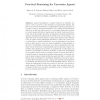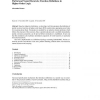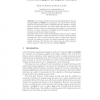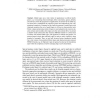78 search results - page 9 / 16 » A Logic for Default Reasoning About Probabilities |
JELIA
2004
Springer
14 years 26 days ago
2004
Springer
Logical formalisation of agent behaviour is desirable, not only in order to provide a clear semantics of agent-based systems, but also to provide the foundation for sophisticated r...
JAR
2010
13 years 2 months ago
2010
Based on inductive definitions, we develop a tool that automates the definition of partial recursive functions in higher-order logic (HOL) and provides appropriate proof rules for ...
IFL
2005
Springer
14 years 1 months ago
2005
Springer
In programs written in lazy functional languages such as for example Clean and Haskell, the programmer can choose freely whether particular subexpressions will be evaluated lazily ...
POPL
2012
ACM
12 years 3 months ago
2012
ACM
There has been great interest in creating probabilistic programming languages to simplify the coding of statistical tasks; however, there still does not exist a formal language th...
KI
2008
Springer
13 years 7 months ago
2008
Springer
Abstract. Modal logics see a wide variety of applications in artificial intelligence, e.g. in reasoning about knowledge, belief, uncertainty, agency, defaults, and relevance. From ...




